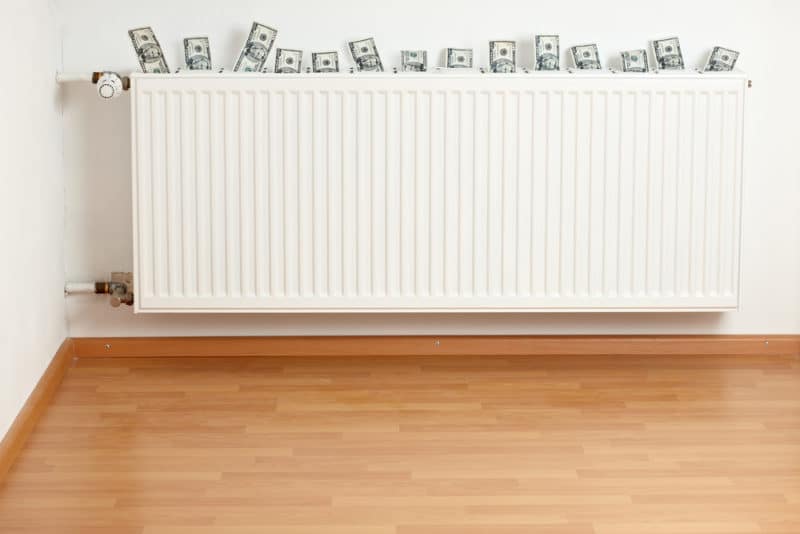Forced air, steam, and hot water are three types of heating systems used in most American homes. All three systems feature some of the same basic parts: a centralized source for heat, conduits that move heat through the house, and appliances that transfer the heat into the rooms of your home. But other systems may not be as common for Savannah, Georgia, homeowners. Find out whether radiant-floor, solar heating, or geothermal heating make financial sense for homeowners seeking a comfortable and energy-efficient home.
Radiant-Floor Heating
With radiant-floor heating, heat gets pumped through a system of channels or pipes usually installed under flooring. The heat can be supplied by water, hydronic heat, or electricity. Most homeowners who use this form of heating choose water because it’s more affordable.
Radiant-floor heating can have many advantages over traditional forced-air heating systems:
- Rooms can get heated more evenly, from the bottom up.
- Uncomfortable drafts and problems with dust can be almost eliminated.
- Once installed, the heating system runs quietly and is invisible.
Heating Your Home
If you choose to install an electric radiant floor, you won’t have to worry about frequent maintenance. If the heat turns off, you contact the manufacturer who can walk you through some troubleshooting. The problem may lie with the power supply, in which case an electrician can help correct the problem. Alternatively, if something malfunctions with the heating under the floor, the manufacturer can refer you to an HVAC services professional that specializes in radiant-floor heating systems.
If you opt for a hydronic radiant floor, you’ll need to maintain the source of the hydronic heat, generally a boiler. You also don’t want to drill into floors or ceilings as you can puncture pipes and cause leaks to occur. If a leak develops, you’ll need to contact a plumbing and heating professional that specializes in hydronic heating.
Before you consider radiant-floor heating, consider the following:
- Have an engineer help you determine how much weight the floors of your home can handle. You may need to install extra flooring support for the system.
- The best floor surface for this type of heating system is a concrete floor with a ceramic-tile top. If you prefer wood flooring, choose a laminated floor.
- Avoid large amounts of carpeting, as the material can decrease the amount of heat efficiency.
According to HomeAdvisor Inc. figures, installations for electric radiant-floor heating systems average about $8 per square foot minimum and about $6 per square foot minimum for hydronic systems.
Solar Heating
This type of heating system uses the sun’s energy to heat water, create electricity, or heat a house. Some utility providers offer credits to homeowners who install solar heating systems in their homes.
Leveraging the sun’s power occurs in three ways:
- Solar water heaters are usually placed in a basement or garage. These heaters hold water that gets pumped through a solar-energy collector mounted on the roof. The heated water can then get transferred to a standard water heater or stored in another tank.
- Passive solar heating uses solar collectors, which can be building or architectural materials that absorb the sun’s energy. For example, a dark stone floor in front of a south-facing window in your home can absorb heat and radiate it back into a room.
- Photovoltaic systems rely on large panels attached to the roof, usually arranged in a south-facing direction. These panels contain solar cells that convert sunlight into electricity. The electricity gets directed to a home’s wiring. If the system generates less power than needed, power from the utility provider makes up the difference. If the system generates too much power, the excess flows onto utility wires, your meter turns backward, and you get a credit from the utility company. Keep in mind that these panels are not particularly attractive, but the building industry has started to incorporate photovoltaic cells into exterior elements such as awnings or skylights.
Solar Heating For Your Home
Before you consider installing a mechanical solar-heating system to complement an HVAC system upgrade in your home, make sure you check with local building codes in your area. Some restrictions may apply. Also check with your utility provider to verify whether you can qualify for credits on your home heating bill if you install this type of system in your home.
According to figures from EnergySage, in 2017, homeowners can expect to spend between $2.87 and $3.85 per watt to install solar panels, with the average cost (before tax credits) being about $16,800. Assuming the U.S. average system size is about 5 kW (about 5,000 watts), EnergySage estimates the cost range after tax credits to be about $10,045 to $13,475.
Geothermal Heating
Outdoor air temperatures change regularly from season to season. But about 4 to 6 feet down below the earth’s surface, temperatures remain consistent throughout the year. Geothermal HVAC systems take advantage of these consistent temperatures to heat and cool a home.
A geothermal heating system generally has an indoor unit and a piping system buried underground, often referred to as an earth loop. During the winter months, fluid moving through the earth loop absorbs heat stored in the ground and transfers that heat indoors. An indoor unit takes this heat and shifts it to higher temperatures, distributing that heat throughout a home. During the summer, a geothermal HVAC system transfers heat from the home and carries the heat through the earth loop where it releases the heat back into the earth.
Unlike traditional home HVAC systems, geothermal HVAC systems don’t use fossil fuels to produce heat. The system simply transfers heat back and forth from earth to home. Electricity is generally used to power the system’s fan, pump, and compressor.
Geothermal HVAC systems offer several advantages for homeowners:
- The systems do not require significant amounts of maintenance. Once installed, the buried earth loop can serve the system for many years. Since the system’s fan, compressor, and pump are housed indoors, these components too can run for many years without needing continual maintenance. Generally, coil cleaning and air filter replacements are the two regular maintenance tasks involved with these systems.
- According to Jay Egg, author of the book “Modern Geothermal HVAC Engineering and Control Applications,” geothermal HVAC systems require only a unit of electricity to transfer up to five units of heat or cooling from the earth to a home or structure.
- Egg also notes that geothermal HVAC systems pull about four times more kilowatt-hours of energy usage from the electrical grid for each dollar spent when compared to what photovoltaic and wind power provide to the electrical grid.
Before you consider installing a geothermal HVAC system in your home, consider the following:
- Upfront costs to install a geothermal HVAC system are some of the largest expenses associated with these types of systems. According to Energy Environmental, installation for a 2,500-square-foot home carrying a heating load of 60,000 BTU and cooling load of 60,000 BTU will run between $20,000 and $25,000. These figures are about double the cost of the installation of a conventional HVAC system.
- Drilling and installation will disrupt your home’s landscaping. If you have a well-established lawn or landscape surrounding your home, be aware that drilling and digging equipment to install the system will impact the look of your landscape.
- New home construction is generally best for the installation of new geothermal HVAC systems. Retrofitting an existing HVAC system to geothermal often requires ductwork modifications and other adjustments to convert a conventional HVAC system over to geothermal.
According to Energy Environmental, paybacks for homeowners with geothermal heating systems typically range from between two to 10 years, with the lifetime of a geothermal system averaging about 18 to 23 years. Over time, a geothermal system can reduce utility bills by 40 to 60 percent.
Before deciding whether to install an alternative heating system in your home, consider all of your costs carefully. Focus not only on the savings on your monthly utility bills, but also on the up-front costs for installation. For expert information, turn to one of our home HVAC service specialists at Byrd Heating and Air Conditioning. With more than 30 years of experience, our team can help provide you with the information you need to create a comfortable home. Call us at 912-373-8447.
Image provided by Shutterstock


